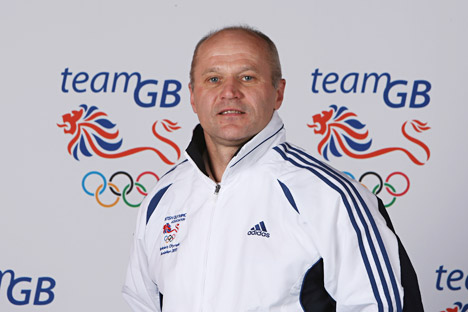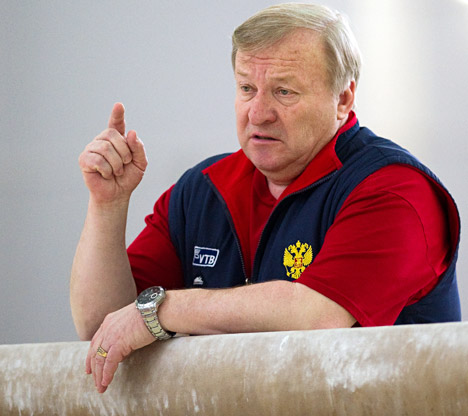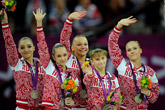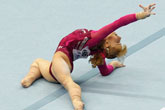What happened to the Soviet Union’s gymnastics coaches?

Once Popov realized that there is no serious adult gymnasts in the UK and started coaching juniors. Source: Getty Images / Fotobank
The Soviet Union’s gymnastics coaches were heralded around the world for their training methods. Others tried to copy Soviet methods, and the Soviet athletes were among the leading contenders in international competitions.
But then a powerful wave of migration began in the ‘90s and took with it the best Russian coaches. The new Russia was not for them, and they preferred to go where they were wanted and needed. Not all of them were able to make successful careers abroad. RBTH takes a look at how the Soviet school took root in foreign lands.
Russia – Great Britain
"I left for Great Britain in 1991. There were gymnastic exhibition shows in Liverpool, and at that time we were glad to travel abroad to bring back jeans," says Andrei Popov, now the head coach of the United Kingdom’s gymnastics team.
In 1991, Popov was approached by the director of a local school and offered a position with them. For the first five years he worked in a regular gymnastics club.
"Of course, I had much greater ambitions than the ordinary coach," said Popov. His chance came in 2004, when a search was announced for head coach of the men's national team.
"Not a single member of the UK national men's team had made it to the Olympic Games. I decided to take a chance, sent my resume, had an interview, and I was entrusted with the team.”
Popov said that at that time there were no serious adult gymnasts in the country, so he started coaching “juniors.”
“I scouted throughout England, and found five or six people. A year later, we competed at the European championships and, to everyone's amazement, took fourth place. These same guys won the team bronze medal a few years later at the London Olympics, the first one in 100 years," said Popov. "The more I work with these guys, the more I am impressed by their work ethic. We trained for three hours in the morning and for four hours in the evening. They handled it just fine. The authorities saw our progress and found additional funding."
Popov said he had dreamed about winning an Olympic medal.
“No one even expected a team medal in gymnastics. But most importantly, during my years with the British team, we have started to see not only talented kids, but also coaches who have learned to work from us," said Popov. "After the Olympics, the prime minister invited the federation leadership to visit him and said, ‘So there is gymnastics in Britain after all. I didn't know that.’"
U.S. – Russia – Brazil
"In America, you can't tell parents that their child isn't talented. There everyone is talented! And when one of the kids at the gym is better and one is worse, problems begin, people complain," said Alexander Alexandrov about his American experience.

At the London Olympics in 2012, Alexandrov's team competed successfully and received a gold, two silver and three bronze medals. Source: Alexander Vilf / RIA Novosti
Before the collapse of the USSR, Alexandrov had been the head of the women's national team, but afterwards, he ended up in the United States.
"In America, gymnastics is first and foremost a business," he explained. "If you start a gymnastics club, first you have to think about how to make money. Children and parents see victories on TV and are willing to pay to learn how to do that too. Many want to train in the same clubs where the champions trained. If they see results, that means there is a good coach.”
On the one hand, the kids won't be hanging out on the street if they are in the training clubs, he said.
"If they are successful, then at least they will have a chance to go to college. If there is a chance to make it onto the national team and go to the Olympics, that's a completely different kind of payback,” he said. “This kind of system would not work in Russia. Our system is centralized and not a club system with a business plan."
Alexandrov knows about the problems in Russian gymnastics, but not just from conversations with colleagues. In 2008, he returned to his homeland and was asked to head the women's national team. After two years, for the first time in Russian history, the team won the all-around gold at the world championships. That's also when the world first learned about Aliya Mustafina, a girl who had planned to end her career before Alexandrov returned to Russia.
At the London Olympics in 2012, his team competed successfully and received a gold, two silver and three bronze medals. But instead of celebrating, afterwards Alexandrov was accused of giving too much attention to Mustafina and not enough to the other gymnasts.
After London, Alexandrov led the Brazilian national team.
"Brazil also has its problems. There are not even any decent gyms,” he said. “There, like in America, gymnasts train in different clubs. But, unlike in the U.S., the clubs are not well run. Therefore, it's necessary to have centralized training for the national gymnastics team. And I'm still struggling with the notorious language barrier."
This is abridged version of the article first published in Russian in Russkiy Reporter.
All rights reserved by Rossiyskaya Gazeta.
Subscribe
to our newsletter!
Get the week's best stories straight to your inbox

